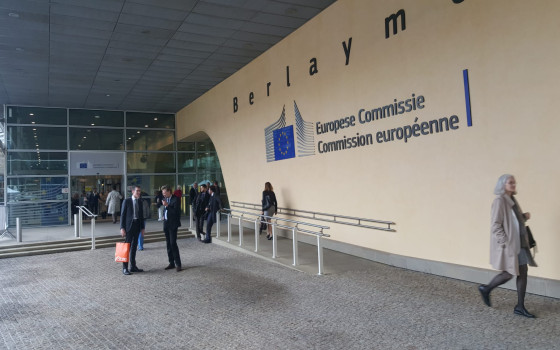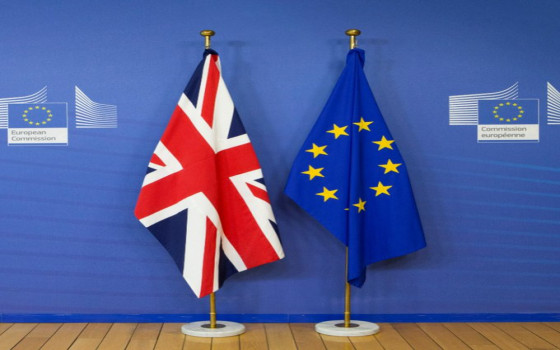
Brussels Commission: The collective efforts of member states in light of the current scenario will not live up to the European Union’s ambition for digital transformation.

- Europe and Arabs
- Tuesday , 2 July 2024 17:48 PM GMT
Brussels: Europe and the Arabs
The European Commission in Brussels today published the second State of the Digital Decade report, which provides a comprehensive overview of the progress made in pursuit of the digital goals and targets set for 2030 by the Digital Decade Policy Program (DDPP). This year, for the first time, the report is accompanied by an analysis of the National Strategic Roadmaps for the Digital Decade presented by the Member States, which detail the planned national measures, actions and financing to contribute to the EU's digital transformation.
The Commission's analysis shows that, under the current scenario, the collective efforts made by Member States will fall short of the EU's ambition. The identified gaps include the need for additional investments, at EU and national levels, particularly in the areas of digital skills, high-quality connectivity, the uptake of artificial intelligence (AI) and data analytics by companies, semiconductor production and start-ups. Ecosystems.
Both the EU and Member States play an important role in enforcing the new legal framework, taking the necessary measures to promote the diffusion of digital technologies and ensuring that their citizens are equipped with sufficient digital skills to fully benefit from the digital transformation. That is why this year's report represents a call for Member States to step up and be more ambitious, as achieving the goals of the Digital Decade in digital infrastructure, businesses, skills and public services is crucial to the future economic prosperity and societal cohesion of the EU.
In this context, the Commission has also updated the country-specific and cross-cutting recommendations for each EU Member State to address the identified gaps.
A competitive, sovereign and resilient EU: digital infrastructure and businesses
The adoption and development of innovative technologies is crucial for Europe's competitiveness, particularly in the current geopolitical landscape and due to growing cybersecurity threats, requiring enhanced resilience and strong security measures.
The report highlights that the EU is far from achieving the connectivity targets set by the DDPP: fibre-optic networks, critical for providing gigabit connectivity and enabling the uptake of cutting-edge technologies such as artificial intelligence, cloud and the Internet of Things (IoT). ), reaching only 64% of families. Today, high-quality 5G networks reach only 50% of the EU territory and their performance is still insufficient to provide advanced 5G services. To address these challenges, Member States and the Commission should work together to promote a truly effective digital single market.
In 2023, European companies' uptake of AI, cloud and/or big data was well below the Digital Decade target of 75%. Under current trends, only 64% of companies will use the cloud, 50% big data, and only 17% AI by 2030. To achieve business digitization, it is crucial to incentivize SMEs to use innovative digital tools. In particular cloud and artificial intelligence, as well as mobilizing more private investments in high-growth startups. This is crucial to maintaining Europe's competitiveness in terms of data-driven innovation, efficiency and growth.
Another major challenge facing digital transformation in the EU remains the limited diffusion of digital technologies outside major cities. To address this digital divide, it is necessary to strengthen cooperation between European actors at local and cross-border levels, for example through multi-country projects, European Digital Innovation Hubs (EDIHs) and European Digital Infrastructure Consortiums (EDICs). A series of successes have been achieved since last year in this regard, with three EDIC centers established by the end of May 2024.
Digital policy for people and society: digital skills and public services
Putting people at the heart of the digital transformation of our societies and economies is the essence of the Digital Decade and the first principle of the Declaration on Digital Rights and Principles.
At present, the digital skills targets set by the Digital Decade are still far from being achieved, with only 55.6% of the EU population having at least basic digital skills. On current trend, the number of ICT professionals in the EU will reach around 12 million in 2030, with the gender imbalance persisting. To achieve the goals, Member States should take a multifaceted approach to promote digital skills at all levels of education, and motivate young people, especially girls, to be interested in STEM disciplines.
Member States are progressing towards the goal of making all key public services and electronic health records accessible to citizens and businesses online, as well as providing them with a secure electronic identity (eID). Despite uneven uptake across member states, e-ID is currently available to 93% of the EU population, and an EU digital ID wallet is expected to stimulate its use.
However, under a business-as-usual scenario, achieving 100% digital public services for citizens and businesses by 2030 remains difficult.
Next steps
Member States will now have to review and adjust their national roadmaps to align with the ambition of the Digital Decade Policy Program before 2 December 2024. As set out in the DDPP, the Commission will monitor and evaluate the implementation of these recommendations and report back. Progress report on the state of the next digital decade in 2025. According to the European Commission statement the path to the digital decade, proposed in September 2021, sets out a clear way forward for achieving digital transformation in the EU. In December 2022, the European Declaration on Digital Rights and Principles complemented the Declaration by setting out the principles and obligations that digital transformation in the EU should follow. The first report on the state of the digital contract was published in September 2023.
This year's report is accompanied by a comprehensive collection of staff working documents, reports and studies, showcasing progress made in the various dimensions of the DDPP. The Commission's Joint Research Center (JRC) has also contributed to this monitoring exercise, providing the methodology for compiling national digital targets at EU level and mapping the amount of investment from EU financing instruments that goes to initiatives that have a digital component.
During the current mandate, the European Union has taken important actions to advance the goals and objectives of the Digital Decade. By proposing and adopting key legislation, it has actively promoted a safer online space for European citizens and strengthened consumer protection, while protecting the innovation potential of European companies. Significant EU funding has also been made available to promote digital transformation, in particular through the Recovery and Resilience Facility (€150 billion), Digital Europe (€7.9 billion) and the Connecting Europe 2 Digital Facility (€1.7 billion).












No Comments Found